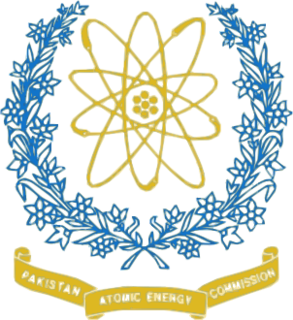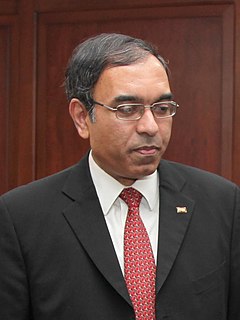Related Research Articles

The Bangladesh Awami League, often simply called the Awami League or AL, is a social liberal political party in Bangladesh and one of the major political parties in Bangladesh, being the ruling party of Bangladesh since 2008.

The South Asian Association for Regional Cooperation (SAARC) is the regional intergovernmental organization and geopolitical union of states in South Asia. Its member states are Afghanistan, Bangladesh, Bhutan, India, the Maldives, Nepal, Pakistan and Sri Lanka. SAARC comprises 3% of the world's area, 21% of the world's population and 4.21% of the global economy, as of 2019.

The University of Engineering and Technology, Lahore is a public university located in Lahore, Punjab, Pakistan specializing in science, technology, engineering and mathematics (STEM) subjects. It is the oldest and one of the most selective engineering institutions in Pakistan.

The Government of Pakistan abbreviated as GoP, is a federal government established by the Constitution of Pakistan as a constituted governing authority of the four provinces, two autonomous territories, and one federal territory of a parliamentary democratic republic, constitutionally called the Islamic Republic of Pakistan.

The National Institute of Science Communication and Information Resources (NISCAIR), located at New Delhi, India, was an information science institute in India founded in 2002. In 2021, the institute was merged with National Institute of Science, Technology and Development Studies to form National Institute of Science Communication and Policy Research. It operated under the umbrella of the Council of Scientific and Industrial Research (CSIR) that comprise 38 other labs and institutes in India. The institute published several academic journals and magazines.

The Pakistan Council of Scientific & Industrial Research (PCSIR) is a government-owned science and industrialisation research organisation which mainly focuses on the development of industrial research. Initially established as Pakistan Department of Research in 1951, it was reformulated in its current state in 1953.

Manzoor Alam Beg was a Bangladeshi photographer. He was awarded Ekushey Padak in 2007 by the Government of Bangladesh.

The Pakistan Atomic Energy Commission (PAEC) ; is a federally funded independent governmental agency, concerned with research and development of nuclear power, promotion of nuclear science, energy conservation and the peaceful usage of nuclear technology.
COMSTECH is an abbreviation for the Organisation of Islamic Cooperation's (OIC) Standing Committee on Scientific and Technological Cooperation for the promotion and cooperation of science and technology activities among the OIC member states.

Muhammad Qudrat-i-Khuda was a Bangladeshi organic chemist, educationist and writer. He founded the Bangladesh Council of Scientific and Industrial Research. From 1969 till 1972, he served as the president of the Pakistan Academy of Sciences. After the independence of Bangladesh, as a chairman of the National Education Commission, he published a report named Qudrat-i-Khuda Education Commission Report.
The Council for Scientific and Industrial Research (CSIR) is South Africa's central and premier scientific research and development organisation. It was established by an act of parliament in 1945 and is situated on its own campus in the city of Pretoria. It is the largest research and development (R&D) organisation in Africa and accounts for about 10% of the entire African R&D budget. It has a staff of approximately 3,000 technical and scientific researchers, often working in multi-disciplinary teams.
Bangladesh Council of Scientific and Industrial Research (BCSIR) is a scientific research organization and regulatory body of Bangladesh. Its main objective is to pursue scientific research for the betterment of the Bangladeshi people. It was established on 16 November 1973.
In Bangladesh, the cultivation of modern science started during the British rule when the first modern educational institutions, focused on scientific fields, were established in the country. The University of Dhaka, established in 1921, acted as the driving force in producing many renowned scientists in Bangladesh.
The Ministry of Science and Technology is a ministry of the government of Bangladesh which coordinates science and technology activities in Bangladesh.

Secretary-General of the South Asian Association for Regional Cooperation, is head of a SAARC Secretariat, which is headquartered in Kathmandu, Nepal. SAARC is an economic and geopolitical union between the eight South Asian member nations, Afghanistan, Bangladesh, Bhutan, India, Maldives, Nepal, Pakistan and Sri Lanka. Secretary-General is appointed for a three-year term by election by a council of Ministers from member states. Secretary-General is assisted by eight deputies, one from each nation, who also reside in Kathmandu. SAARC Secretariat was established in Kathmandu on 16 January 1987 by Bangladeshi diplomat Abul Ahsan, who was its first Secretary-General, and was inaugurated by King Birendra Bir Bikram Shah of Nepal. Since its creation, its member nations have contributed to a total of fourteenth General Secretaries. Sri Lanka's diplomat Esala Weerakoon is the current Secretary-General, having assumed charge on 1 March 2020.
Bal Raj Nijhawan, was an Indian metallurgist, author and the first Director of Indian origin of the National Metallurgical Laboratory, Council of Scientific and Industrial Research (CSIR). He was a recipient of Shanti Swarup Bhatnagar Prize, the highest Indian science award, which he received in 1964 in the Engineering sciences category. The Government of India honoured him in 1958, with the award of Padma Shri, the fourth highest Indian civilian award for his services to the nation.
Murali Sastry is an Indian material chemist, nanomaterial scientist and the chief executive officer of IITB-Monash Research Academy. He is a former chief scientist and Tata Chemicals and a former senior scientist at National Chemical Laboratory. He is known for his studies on surfaces, films and materials chemistry and is an elected fellow of Maharashtra Academy of Sciences and the Indian Academy of Sciences The Council of Scientific and Industrial Research, the apex agency of the Government of India for scientific research, awarded him the Shanti Swarup Bhatnagar Prize for Science and Technology, one of the highest Indian science awards, in 2002, for his contributions to chemical sciences.

The Government agencies in Bangladesh are state controlled organizations that act independently to carry out the policies of the Government of Bangladesh. The Government Ministries are relatively small and merely policy-making organizations, allowed to control agencies by policy decisions. Some of the work of the government is carried out through state enterprises or limited companies.
References
- 1 2 Sobhan, M. Abdus. "BANSDOC". Banglapedia. Retrieved 28 November 2016.
- ↑ Chatterjee, Amitabha (5 November 2016). Elements of Information Organization and Dissemination. Chandos Publishing. p. 339. ISBN 9780081020265 . Retrieved 28 November 2016.